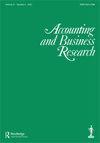多模式标准化与可比性:挪威采用中小型企业国际财务报告准则的失败尝试
IF 1.4
4区 管理学
Q2 BUSINESS, FINANCE
引用次数: 2
摘要
事实证明,国际财务报告准则和非国际财务报告准则的共存在国家层面具有挑战性。我们利用多模式标准化视角,认识到委员会、市场参与者和政府之间的相互作用,来检查挪威的多标准财务报告,并将重点放在两个平行的努力上,这两个平行的努力引入了以中小企业国际财务报告准则为基础的国家会计准则。在我们的案例中,管辖权的紧张源于政府监管财务报告的广泛职权范围,以及国家标准和标准制定者的模糊法律地位。可比性经常被认为是财务报告标准化的中心目标之一。因此,不同的玩家如何利用这个概念是很有趣的。我们发现,标准所要达到的可比性范围没有得到充分的考虑。就各项建议所提供的反馈意见强调,可比性的范围对标准的使用者很重要。他们专注于最可能的比较,并希望在类似类型的公司和行业之间保持全国性的关注和可比性。他们不认为标准化工作和建议取消标准和备选办法必然有利于可比性。本文章由计算机程序翻译,如有差异,请以英文原文为准。
Multi-mode standardisation and comparability: Norway's failed attempt to adopt the IFRS for SMEs
The coexistence of IFRS and non-IFRS standards has proven challenging at the national level. We utilise a multi-mode standardisation perspective that recognises the interplay of committees, market players, and the government to examine multi-standard financial reporting in Norway and focus on two parallel efforts that introduced proposals to base the national accounting standards on the IFRS for SMEs. In our case, the jurisdictional tensions stem from the broad remit of the government to regulate financial reporting and the ambiguous legal standing of the national standards and of the standard setter. Comparability is often cited as one of the central aims of standardisation in financial reporting. Consequently, how different players utilise the concept is of interest. We find that the scope of comparability that the standards aim to achieve is not given sufficient consideration. The feedback provided with regard to the proposals underscores that the scope of comparability is important for the users of the standards. They focus on the most likely comparisons that are made and want to maintain a national focus and comparability across similar types of companies and industries. They do not regard the standardisation efforts and proposed elimination of standards and options as necessarily beneficial for comparability.
求助全文
通过发布文献求助,成功后即可免费获取论文全文。
去求助
来源期刊

Accounting and Business Research
BUSINESS, FINANCE-
CiteScore
3.40
自引率
11.80%
发文量
38
期刊介绍:
Accounting and Business Research publishes papers containing a substantial and original contribution to knowledge. Papers may cover any area of accounting, broadly defined and including corporate governance, auditing and taxation. However the focus must be accounting, rather than (corporate) finance or general management. Authors may take a theoretical or an empirical approach, using either quantitative or qualitative methods. They may aim to contribute to developing and understanding the role of accounting in business. Papers should be rigorous but also written in a way that makes them intelligible to a wide range of academics and, where appropriate, practitioners.
 求助内容:
求助内容: 应助结果提醒方式:
应助结果提醒方式:


